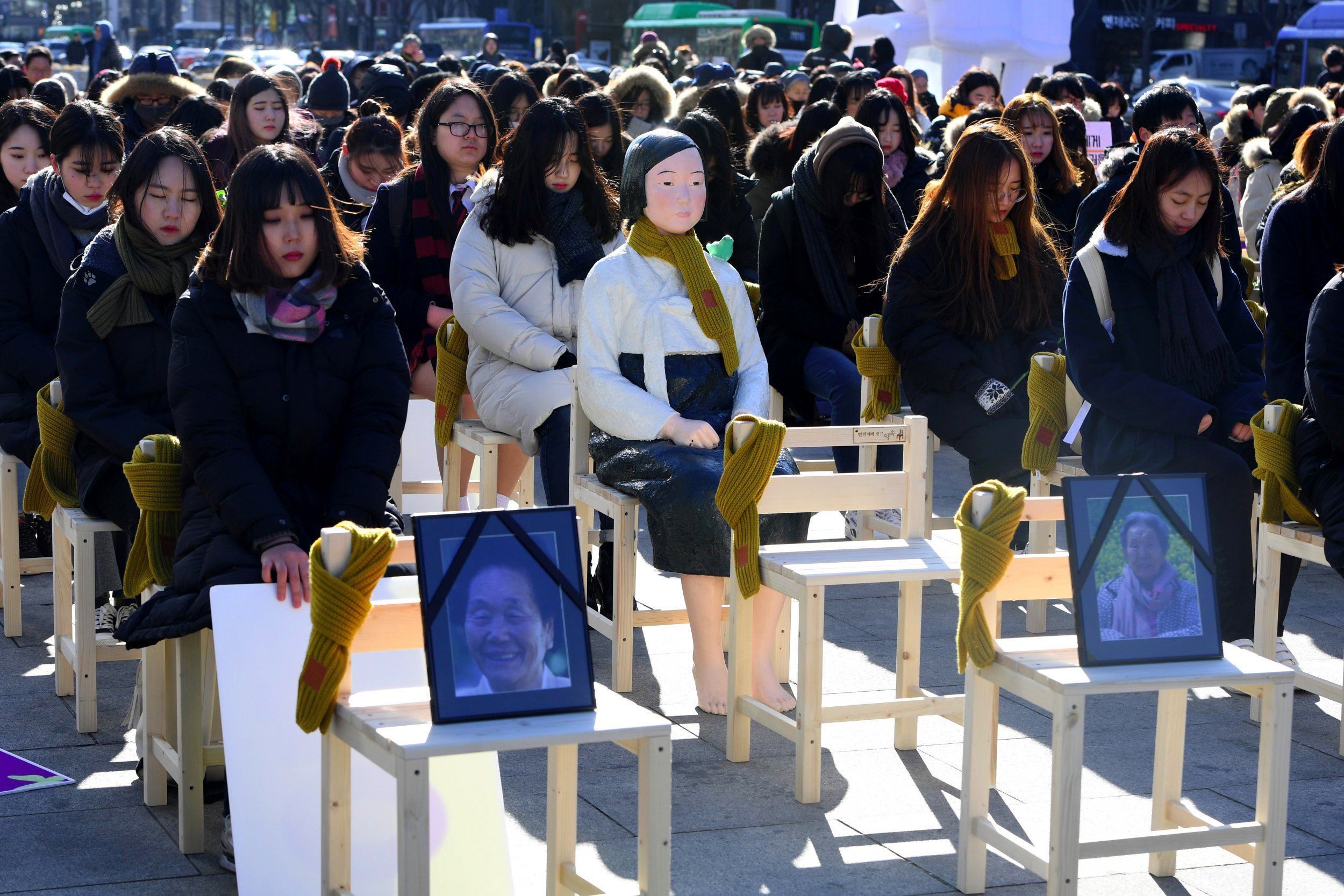
A team of South Korean researchers presented what they believe to be the first video evidence of a mass grave of the so-called "comfort women," a term that derives from a Japanese euphemism indicating the thousands of young women and girls of various ethnicities, nationalities and backgrounds the Japanese military forced into sexual slavery during World War II.
Sungkonghoe University professor Kang Sung-hyun presented the footage at an international conference on wartime sexual slavery held in Seoul on Tuesday, Yonhap news agency reported. The graphic video shows a group of naked female bodies laying on the ground. A Chinese soldier can be seen inspecting the corpses, taking a sock off one of them before walking out of the shot.
Kang and his team unearthed the 19-second clip at the U.S. National Archives and Records Administration. The investigation is part of a project funded by the Seoul Metropolitan Government and the Seoul National University Human Rights Center.
According to the researchers, the video dates back to September 15, 1944, and was filmed by a soldier identified as Private Baldwin of the U.S. Army Signal Corps' 164th Photographic Unit in the Chinese city of Tengchong in the Yunnan province, near the border with Myanmar.
[Warning: The following video contains graphic images]
The footage was discovered last year, but researchers spent months verifying it and cross-referencing it. The images in the video are consistent with additional photographic and documentary records of the massacre of 30 Korean women and girls perpetrated by Japanese forces, found in U.S. archives. One such piece of evidence is an Allied forces' operation diary reading: "Night of the 13th, the Japs shot 30 Korean girls in the city."
"All of the reports about wartime conditions that appear in the documents are written in the passive voice except for the record from Sept. 14, 1944, which says that Japanese troops did the shooting. That's the only sentence that identifies the responsible party," Kang said, quoted in Korean news publication Hankyoreh.
Researchers believe there were between 70 and 80 Korean women who were held as sex slaves in the city when allied U.S.-Chinese forces liberated Tengchong from Japanese occupation during a three-month battle from May to September 1944.
According to prisoners of war records, the Allied forces only captured 23 women. Another video—filmed in the Yunnan province in 1944—the researchers unearthed and unveiled to the public in July showed Chinese soldiers interacting with barefoot, frightened-looking women presumed to be trafficked by the Japanese to their "comfort station"—a euphemism for brothel—in Longling County, south of Tengchong.
"Due to a long-standing dispute over Japan's wartime sexual slavery, it became crucial to come up with evidence. This video clip will strengthen the admissibility of evidence behind wartime sex slavery," said professor Kang at the time, quoted in The Korea Herald.
The "comfort women" issue has long been—and continues to be—a source of conflict between Japan and the countries it occupied in World War II such as China and South Korea. As recently as this week, Japan forcefully complained about the use of the terms "sex slaves" by a South Korean minister at a U.N. session last week.
South Korea's Gender Equality and Family Minister Chung Hyun-back said it was "important to preserve and commemorate the memories and experiences of the Japanese army's sex slaves," an expression the Japanese government protested, as it "contradicts the facts and should not be used," The Financial Times reported on Tuesday.
The controversy has also affected relations between Osaka and San Francisco, which were sister cities until the mayor of Osaka decided to cut ties with the American city after San Francisco endorsed plans to erect a statue in memory of "comfort women."
Professor Kang, however, told UPI the U.S. has tried to keep evidence of the Japanese army's alleged atrocities away from public scrutiny in order to not hurt its military interests in the region. In fact, the U.S. relies heavily on the alliance with Japan and South Korea to face regional threats such as China and North Korea.
"For the United States, past [historical] issues, such as the issue of comfort women, is something that is pertinent to its alliances," he said.
Uncommon Knowledge
Newsweek is committed to challenging conventional wisdom and finding connections in the search for common ground.
Newsweek is committed to challenging conventional wisdom and finding connections in the search for common ground.
About the writer
Sofia Lotto Persio reports mainly on Asia and gender issues for Newsweek. She previously covered international affairs with a specific ... Read more
To read how Newsweek uses AI as a newsroom tool, Click here.








